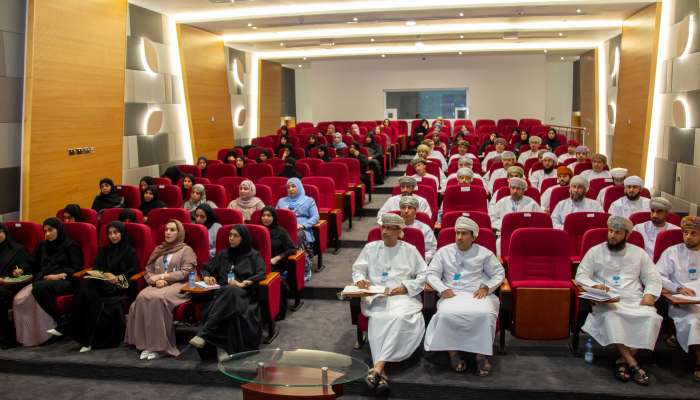
Muscat: The Ministry of Education, represented by the Training and Qualification Department, is implementing a number of training programmes this week, targeting employees in the Ministry’s General Diwan and in the educational directorates in the governorates of the Sultanate of Oman, as part of the professional development plan that the Ministry is working on in various administrative divisions.
On Sunday, Ishaq Al-Sheriani, CEO of the Igna Academy for Economic Consulting and Training, presented a lecture entitled “Financial Culture,” where he introduced the concept of financial culture as a set of ideas and skills that help in identifying the means to manage financial affairs, through learning, or life experience, whether related to personal expenses, professional expenses, or others.
He also touched on the necessity of financial culture, and the ways to identify financial culture through several things, including spending more than the income, reaching a higher credit card limit, consuming more than saving, and not having a clear financial path (salary - payment - saving - investment).
Then he spoke about the art of money management represented by planning personal financial matters, the importance and necessity of financial planning, and touched on the ways to increase income.
Also on Sunday, the training programme for implementing the information security policy standard (ISO/IEC 27001 Lead Implementer) began, which lasts for five days and targets 20 employees from the Directorate-General of Information Technology, the Electronic Information Security Department, and the information technology departments in the educational directorates in the governorates.
The programme aims to train employees on the requirements and procedures for applying the international management system standard in information security and auditing information systems, which in turn contributes to providing a framework for best practices to identify, analyse, and implement the necessary controls to manage electronic security risks.
The training course in the Arc GIS Pro programme also continues until Thursday. The course targets the Geographic Information Systems specialist in the educational directorates in the governorates and is presented by the employees of the Geographic Systems Department. It aims to provide the trainees with the basic skills, capabilities, and knowledge that qualify them to implement various tasks and duties related to the work of geographic information systems at the Ministry of Education, in addition to becoming familiar with and training on some of the tools that are used in geographic spatial analysis, building, and saving geographic databases through the (ArcGIS Pro) programme.
on Monday, a lecture entitled “Artificial Intelligence between Reality and Aspirations” was presented by Said Al-Kalbani, Senior Digital Services Specialist in the Digital Services Department at the Ministry of Education.
He introduced the concept of Artificial Intelligence and stated that it is one of the branches of computer science that depends on creating tools and software capable of simulating partially the human mind. He also addressed the importance of artificial intelligence, the results of studies on it, and its importance in general practices and in administrative work.
He also provided an overview of the most important challenges in artificial intelligence represented in privacy, information security, cognitive bias, lack of cognitive consistency, transparency, limited understanding of the context, and lack of creativity.
Then he spoke about the most important ethics in artificial intelligence, including adherence to privacy, data protection, concern for transparency, and continuous development. He also identified the most important cultural competencies needed by those working in artificial intelligence, and the applications that are of interest to the worker at the administrative work.